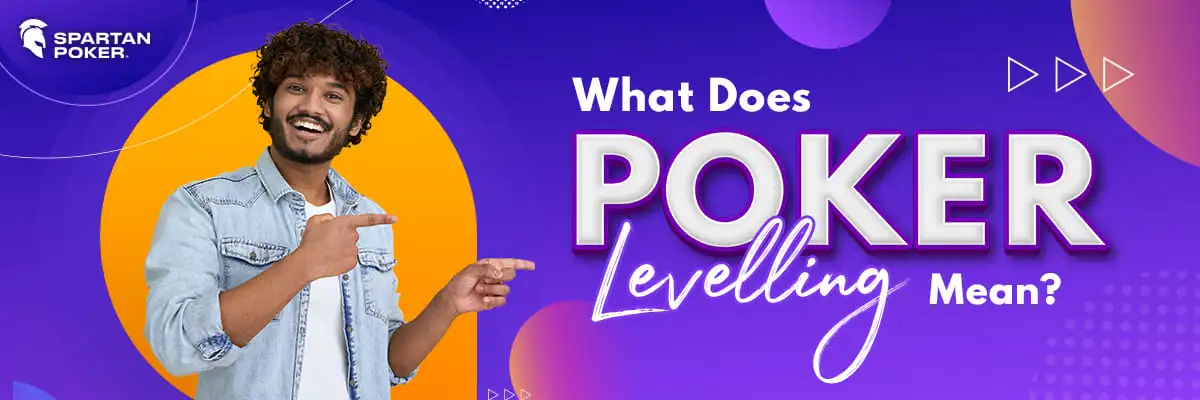Players in the psychological and strategic game of poker must continually adjust to the ways in which their opponents think.
Levelling, or the mental states at which players function during a hand, is a key component of poker strategy. In this article, we'll examine the idea of levelling in poker and how it affects players' choices and tactics.
On the surface, poker is a fairly easy game to play, but it also incorporates a wide range of possibilities and techniques. Regardless of the cards you are holding, you are free to behave anyway you like, which gives you a plethora of possibilities on every street in every hand.
You most likely played poker at its most basic level when you first learned the game, where your cards are the only thing that count.
As you gained more knowledge, you became interested in value betting, bluffing, and other key game ideas that let you to think at even higher levels.
In this article, we'll discuss levelling in poker—the act of attempting to outsmart and outwit our opponents at the tables—as well as the advantages and potential drawbacks it may have.
Let's first define poker levelling and go over its meaning and application in poker before we get into any of those topics.
What Does Poker Leveling Mean?
So what is poker leveling and how does it operate? When the notion is introduced, most inexperienced players ask questions like this one initially.
In a nutshell, Levelling up in poker is the practice of playing a mental game and attempting to outsmart your opponent by speculating on their perceptions of you.
Stated differently, when you "level up," you are attempting to predict your opponent's thoughts about you and modify your approach accordingly.
It can be risky and lead to poor decisions to become overly involved in leveling fights with grinders or poker sharks since this strategy creates a never-ending loop of outwitting your opponent and causes you to lose sight of the basics of the game.
Furthermore, you risk missing important information that could guide your decision-making if you are merely considering what your opponent is thinking while you are not paying attention to the action.
Read - Paisa Kamane Wala App
It is crucial to examine the development of poker psychology in order to fully understand the meaning of leveling up in the game.
Players have continuously modified their strategies to obtain an advantage over their rivals, from the early days of simple strategy to the present day of sophisticated game theory.
The Poker Leveling Levels
Level 1: Beginner's Play
When they are first starting out, gamers frequently rely their decisions only on their manual dexterity. They are unable to look past the obvious and disregard the viewpoints of their opponents.
Gaining an advantage over these players becomes essential for those trying to go up the ladder of leveling.
Level 2: Fundamental Observation
As they advance, players start to watch and classify their rivals according to distinguishable characteristics. This covers habits, bet sizes, and playing styles. Players at Level 2 mostly make reactive judgments in response to the data that is presented to them.
Level 3: Predicting Reactions from Opponents
To advance to Level 3, one must predict the responses of opponents in a particular scenario. In addition to considering their own hand, players begin to speculate about what their opponent might be holding and how they might react to various moves. At this point, bluffing and counterbluffing become essential strategies.
Past Level 3: The Never-Ending Mental Struggle
Although some conversations end at Level 3, poker is a game that is always changing. Players move into a domain where the metagame is constantly changing when they reach Level 3. Remaining adaptable, successful players modify their tactics to stay ahead of the changing dynamics at the table.
Uses of Poker Levelling in Real World Applications
1. Confusing Actions
Competent players can take advantage of their opponents' inclinations by knowing the level at which they operate. To maximize value, this may entail varying stake sizes, playing particular cards, or taking advantage of recurring trends.
2. Bluffing and Retaliating to Bluffs
A key component of the art of bluffing is poker leveling. Competent players take into account not only the strength of their own hand but also the possibility that their opponent will fold given the bluffer's hand's perceived strength. In contrast, in order to keep opponents guessing, players need to be skilled in counterbluffing.
3. Table Structure and Visual Aids
A player's behavior and choices at the table shape their reputation. Competent levelers are conscious of the impression they give off and deliberately work to improve it. To succeed in the long run, one must be able to adjust to the shifting dynamics of the table.
Read - Real Money Poker
Typical Mistakes in Leveling
There are numerous ways that poker leveling might go awry. You risk making an expensive error that was readily preventable if you errand and think your opponent is doing something they are not.
1. Thinking too much
Players run the risk of overanalysing and getting immobilized by uncertainty as they move up the leveling ladder. To stay out of this trap, it's critical to find a balance between strategic depth and simplicity.
2. Misinterpreting The Enemy
Players with years of experience can still misjudge their opponents. A player may make less-than-ideal choices because they believe their opponent is more skilled than they are. It's important to keep a healthy dose of scepticism and to modify tactics as necessary.
Is It Time to Level Up My Poker Game?
You need to consider whether levelling is necessary and how often it should be done now that you are familiar with the definition and have seen some examples.
In actuality, leveling will typically involve a lot of guesswork, and you won't be able to determine with certainty what level your opponent is currently considering.
If you're known for being a reckless player who frequently bluffs, keep in mind that other players will eventually level up and assume you never have it when you give up on hands occasionally or place thin value bets.
Conversely, if you are thought to be extremely tight, then go ahead and make some big plays that nobody can really call off without the nuts.
Poker leveling is a dynamic and complicated feature of the game that deepens the strategic environment. Understanding and putting the ideas of leveling into practice can be the key to success at the poker table, from the simple observations of a beginning player to the complex mind games at the top levels.
Players must modify their strategies to stay ahead in the never-ending quest to outwit their rivals as the game continues to develop.
Embark on an exhilarating poker journey with Spartan Poker, where the thrill of the cards meets the spirit of competition. Join a vibrant community of players, ranging from novices to seasoned pros, and test your skills on diverse tables and tournaments.
Spartan Poker offers a seamless online platform, ensuring a secure and fair gaming environment. Play poker online now and discover the heart-pounding excitement that awaits you at the virtual poker tables!












